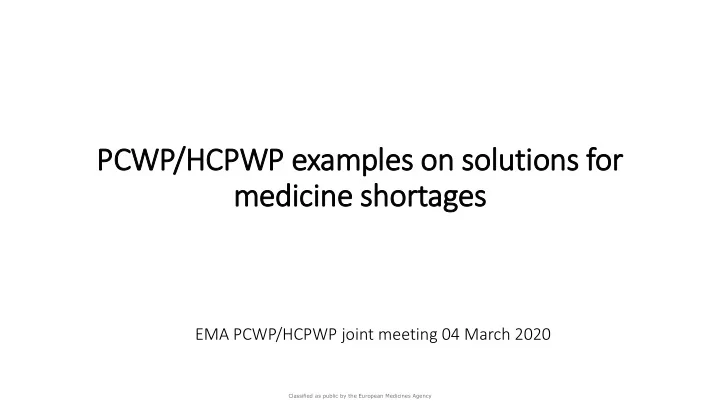

PCWP/HCPWP examples on solutions for medicine shortages EMA PCWP/HCPWP joint meeting 04 March 2020 Classified as public by the European Medicines Agency
Im Impact of f medicine shortages on patients Perceived adverse effects of medicine shortages on patients Results of a 2018 survey run by the French across Europe (% of responding countries) organisation of healthcare users France Assos Santé showed that 25% of respondents had already 100% been denied supply to a medicine because of a 90% shortage. 80% 70% 45% of these impacted respondents had to delay, 60% change or stop treatment, which 21% found 50% distressing. 40% Consequences included aggravation of symptoms 30% (14%), errors when taking an alternative medicine 20% (4%) and even hospitalisation (4%). 10% 0% https://www.france-assos-sante.org/wp- Caused Increased co- Interruption of Medication Sub-optimal Adverse Death Other (please distress and payments treatments errors treatment/ events/greater (3/24) specify) content/uploads/2019/02/Penuries-medicaments- inconvenience (14/24) (18/24) (6/24) inferior toxicity (4/24) (24/24) efficacy (4/24) Resultats-BVA-dec2018.pdf (10/24) Source: PGEU Medicine Shortages Survey 2019 Classified as public by the European Medicines Agency
Impact of Im f medicine shortages on healthcare practice Hospital setting – EAHP Medicine Shortages Survey 2018 link Classified as public by the European Medicines Agency
Impact of Im f medicine shortages on healthcare practice Primary Care – PGEU Medicine Shortages Survey 2019 Classified as public by the European Medicines Agency
Example: shortage of f BCG for patients with bladder cancer Drug shortages are associated with increased medication errors and longer length of stays that increase risks to patients Classified as public by the European Medicines Agency
Good Practices across Europe Classified as public by the European Medicines Agency
Reducing the impact of f shortages in practice Netherlands - Solutions for medicine shortages In 2019, healthcare professionals in the Netherlands were able to ensure continuity of treatment for their patients in 99% of medicine shortages cases: • 73%: solution possible with medicine containing the same active substance (e.g. substituting brand, pack size and/or dosage); • 21%: therapeutic substitution in consultation with the treating physician; • 4%: import from another country; • 1%: preparing a compounded medicine However, the number of medicine shortages in the Netherlands doubled in 2019 (769 -> 1492 cases) Source: KNMP Farmanco Classified as public by the European Medicines Agency
Preventing Shortages of f Medicines UEMO examples Ireland : HPRA publishes weekly updates on medicines shortages. The HPRA has developed a multi- stakeholder framework for handling medicines shortages. All stakeholders can report potential shortages including GPs. Czech Republic : Pharmacies are allowed to make a change within the same generic composition if there´s an available option. Norway and Sweden : Messages on shortages will pop up in the EPS when the GP prescribes. Portugal : Pharmacists are now able to notify shortages of medicines via e-mail, and soon through a web- based platform. United Kingdom : Central cascade system where GP practices are advised of current drug shortages. There is a pharmacist-based system where alternative medications are advised but this still means that GPs have to change or re-write prescriptions. Classified as public by the European Medicines Agency
How French patient organisations contribute to fi fight shortages France Assos Santé Shortages Observatories 1. Objectives • Inform authorities of shortages experienced by patients • Evidence causes and consequences on patients’ health • Trigger public action (crisis management & better regulation) 2. Tools • Online questionnaires addressed to patients and HCP (TRT-5 -2011; SOS-Hépatites-2017) • Organisation’s forum and/or helpline ( EpilepsieFrance -2018) • Surveys on citizens/patients’ experience of shortages (France AssosSanté – Dec. 2018; La Liguecontrele cancer – Results to be published) 3. Results • Wide media coverage • Regular dialogue with the French Medicines Agency and the other stakeholders (Pharma companies etc.) • Legislative framework to better manage and prevent shortages (Laws in 2011 & 2019; Decrees in 2012 & 2016) • MoH plan to fight shortages (July 2019) implemented in cooperation with all stakeholders, including patients (Co- piloting body currently working on solutions in various areas) Classified as public by the European Medicines Agency
Early reporting of f medicine shortages CISMED – Spanish Pharmacists’ warning systems on medicines shortages CISMED is based on a communication infrastructure of pharmacies – provincial chambers – General Pharmaceutical Council of Spain Automatic reporting – after categorisation and consolidation at national level, the shortages are publicly communicated on the General Council website. Real-time measurement of shortages by healthcare professionals with clustering at provincial and national level. Classified as public by the European Medicines Agency
Exchanging best practices Europe – COST action CA15105: European Medicines Shortages Research Network The Action was set up in 2016 with the aim to encourage systematic sharing of information and research about past, ongoing and future shortages of medicines and nutritional products. Participating researchers will conclude their work in autumn 2020. The first publications are already available: Classified as public by the European Medicines Agency
Transparent public communication HMA- EMA Good practice guidance for communication to the public on medicines’ availability issues Principles welcomed by patients and healthcare professionals as a tool to improve transparency and speed of communication about medicine shortages. Implementation at national level should be closely monitored! Classified as public by the European Medicines Agency
Recommend
More recommend